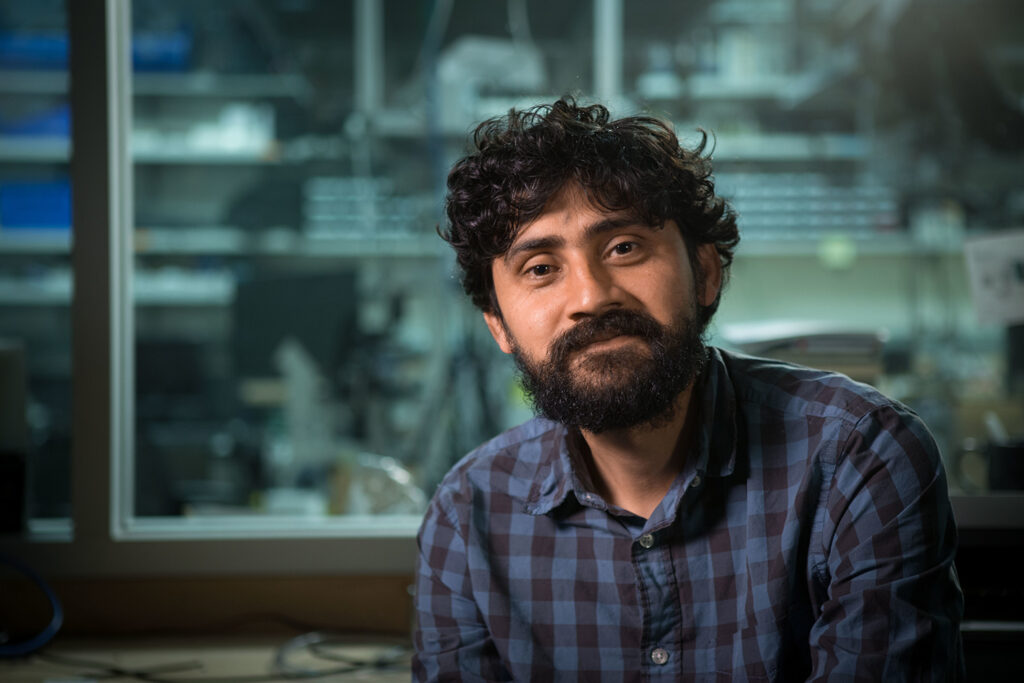Manu Prakash receives Roland Volunteer Service Prize
In the classroom and in the field, the associate professor of bioengineering engages students in finding inexpensive and scalable solutions for global issues.
For the last three years, Manu Prakash has taught BIOE 271: Frugal Science, a course that connects Stanford students with citizen scientists around the world and engages them in identifying and tackling real-world problems. For Prakash, the collaboration is an integral part of the learning experience.
“My contribution in education on this campus is to remind students that unless you engage and get your hands dirty, you cannot understand and unravel the complexity of the problems that we face in health equity, in education equity, and in the context of our environmental challenges,” Prakash said. “The common principle behind this is learning to listen and embedding yourself in a context. You have to solve a problem for one person before you’re going to solve a problem for 100 people, before you’re going to solve a problem for an entire village.”
Prakash, an associate professor of bioengineering and senior fellow at the Stanford Woods Institute for the Environment, has been named the 2023 Miriam Aaron Roland Volunteer Service Prize for his efforts to make science – and its fruits – more accessible for everyone.
Each year, the Roland Prize recognizes a faculty member who involves students in integrating academic scholarship with significant public service contributions. It was established at the Haas Center for Public Service in 2004 with a gift by Miriam Aaron Roland, ’51. Provost Persis Drell presented the prize at an event with the Community Partnership Awards on March 3.
Prakash developed an interest in science while growing up in his hometown of Meerut, India. He received a BTech in computer science and engineering from the Indian Institute of Technology and a PhD in applied physics from MIT. Shortly after joining the Stanford faculty in the department of bioengineering, he started Prakash Lab in 2011.
“The most important thing we can do right now is to make sure that the tools of creativity and the tools of scientific thinking are as broadly accessible as possible.”
—Manu Prakash
Associate Professor of Bioengineering
Of the lab’s inception, Prakash said, “I made a little promise to myself – and I’m glad that I still keep that promise – to spend time thinking about large-scale societal problems in regions around the world and for people around the world who have very little. Engineering and science have a tremendous amount to contribute to make viable solutions for people. But it takes time. It takes scale. It takes a tenacity for us to believe that it will matter.”
The guiding ethos behind the lab’s research is to find cost-effective solutions for global challenges in the areas of health, the environment, and education by working deeply embedded in communities around the world.
This has led to inventions like the Foldscope, a foldable microscope made out of paper and other low-cost materials, designed to be what Prakash calls “the pencil of microscopy” – inexpensive to produce and affordable for everyone. This allows more people to observe the natural world up close who might not have been able to otherwise. It has also led to other community-oriented tools such as the PlanktoScope, an ocean biodiversity mapping tool, and Octopi, an imaging tool for malaria diagnostics.
The thread connecting much of Prakash’s work as a professor and a researcher is making science more equitable. According to Prakash, the value of this work is in equipping others who might not have the tools to engage in science by solving problems in creative ways.
“Access is a no-brainer to me. When I look at my own life, I see kids around me who were just as smart and creative but did not have the opportunities. The most important thing we can do right now is to make sure that the tools of creativity and the tools of scientific thinking are as broadly accessible as possible.”
On March 3, Provost Persis Drell presented the Roland Prize, and Vice President and Chief External Relations Officer Martin Shell presented the Community Partnership Awards. The recipients of this year’s Community Partnership Awards are Climate Resilient Communities: Our Communities Our Bay and Partnership for Climate Justice in the Bay Area, Next Door Solutions and Stanford: Community-First Partnership, and Stanford Redwood City Sequoia School Mental Health Collaborative.
